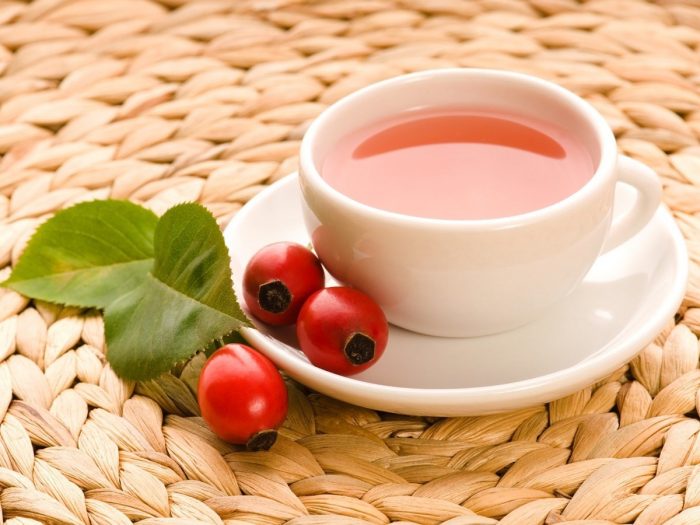The top benefits of rosehip tea may include reducing inflammation, and detoxifying the body. It might also be good for strengthening the immune system, protecting the skin, easing chronic pain, and optimizing the digestive system.
What is Rosehip Tea?
Rosehip tea is made from steeping crushed or dried rosehips, which are the fruits of the rose plant. Following pollination of the flowers, rosehips begin to develop and are typically bulbous red fruits, ranging from the size of a cherry tomato to the size of drupe fruits. Provided you don’t prune back the flowering stems of your rose plant, the majority of species will produce rosehips of some kind.
These fruits have many different uses, both in culinary, medicinal and alternative areas, but tea made from dried rose hips is one of the most popular applications.
Nutrition Facts of Rosehip Tea
The many health benefits available from rosehips may be due to the presence of vitamin C, vitamin B, vitamin E, flavonoids, carotenoids, polyphenols, catechins and other phytochemicals present in both the fruit and extract of the rose plant. While every species of the rose plant might be slightly different in their nutrient concentrations, they may share many of the same compounds, vitamins, and antioxidants. [1] [2]

I am a little teapot, short and stout. Photo Credit: Shutterstock
Benefits of Rosehip Tea
You should consider drinking rosehip tea if you suffer from a weak immune system, skin conditions, chronic pain, indigestion, high toxicity levels, arthritis, gout, inflammatory conditions, high cholesterol, and hypertension.
May Reduce Inflammation
Studies done on rheumatoid arthritis and osteoarthritis showed that rosehip tea may significantly improve mobility and reduce inflammation, thus improving the quality of life and lowering oxidative stress in those inflamed tissues. This may also be helpful for digestion, as these anti-inflammatory properties can soothe the tissues in the gut while regulating bowel movements and ensuring proper nutrient uptake. [3] [4]
May Detoxify The Body
Rosehip tea may also be known for its laxative and diuretic properties, which might help the body eliminate toxins, and unwanted fats and salts in an efficient way. If you are struggling with constipation, low metabolism, or a weakened immune system, it may be a good idea to flush the toxins out and reduce the load on the kidneys and liver. This tea may help you do that by stimulating faster digestion and increasing the frequency of urination. [5]
May Act As An Analgesic
The carotenoids and flavonoids found in rosehip tea may have analgesic properties, making this tea a great pain reliever. Whether it is chronic pain of arthritis or acute pain of injuries or sprains, the anti-inflammatory and analgesic properties may work very quickly. [6]
May Aid In Skin Care
Many people drink rosehip tea to potentially improve the appearance of the skin, as this herbal blend may be known to be astringent, while also delivering powerful antioxidants to the areas of the skin that need it most. This might help reduce the appearance of lines and wrinkles, speed healing of irritated or dry skin, and prevent infections and inflammation, such as flare-ups of psoriasis, eczema, and acne. [7]
May Help Strengthen Immunity
This fruit may have extremely high vitamin C content, which may pack a major punch for a better immune system. It potentially helps increase your white blood cell count and stimulate growth, especially if you are recovering from an injury, illness, or surgery. [8]
How to Make Rosehip Tea?
Rosehip tea can be easily made at home, but the process can be somewhat complicated, depending on which recipe you follow, and how you want to prepare your rosehip tea. Let’s take a look at the two ways you can brew rose hip tea at home.

How to Brew Rosehip Tea: Easy Recipe
Ingredients
- 4 tsp dried rosehip whole or crushed/cut/sifted
- 4 cups water filtered
- 4-5 spearmint or peppermint leaves
- 1 tsp honey or stevia optional
Instructions
Rosehip Tea From Whole Rosehips
- Add whole rosehips and water to a stainless steel pot.
- Slowly bring the mixture up to a boil, and then reduce it to a simmer.
- Allow the mixture to steep for 5 minutes.
- Remove from heat and add the spearmint/peppermint leaves or stevia, if desired, for sweetness.
Rosehip Tea From Ground Rosehips
- If you follow this method, you will need to grind your dried rosehips in a spice mill or blender, and then sift the ground mixture through a sieve.
- At that point, you can brew your tea with the resultant powder. Boil water and add the ground rosehip tea powder to it and let steep for 5 minutes.
- You can add the spearmint/peppermint leaves or stevia, if desired, for sweetness. Enjoy your rosehip tea!
Side Effects of Rosehip Tea
While many people praise the many health benefits of rosehip tea, side effects such as gastrointestinal issues, sleep problems, bleeding and kidney stones, may exist. Some people should also avoid using rosehip tea based on their medical history or present conditions.
- Stomach Problems: The most common side effects of drinking rosehip tea may be gastrointestinal issues such as diarrhea, cramping, nausea and bloating. Constipation and vomiting may also occur. This is commonly seen when people drink too much rosehip tea, but these symptoms may also affect anyone with an allergy to rosehips. Allergic reactions may also include swelling of the lips, tongue, and throat, and should be taken seriously.
- Insomnia/Fatigue: Occasionally, people may experience disturbances in their sleep patterns when taking rosehip tea. This might take the form of fatigue or weakness during the day, or an inability to fall asleep at night. Speak to your doctor before taking this tea, particularly if you struggle with sleep.
- Bleeding: The active compounds in rosehip tea may exacerbate bleeding conditions, as it may prevent blood clotting, so this tea is not recommended for those with bleeding disorders.
- Kidney Stones: Some studies have shown that high concentrations of vitamin C, which this tea might contain, may increase the risk of developing kidney stones, specifically for men. Speak to your doctor about your particular conditions and risks before adding this tea to your health regimen.
- Pregnancy: There is a lack of research on the effects of rosehip tea on pregnancy, but due to the hormonal effects and suppression of menstrual cramps that occur after having this tea, it might not recommended for pregnant women, particularly those in their first and second trimesters.
